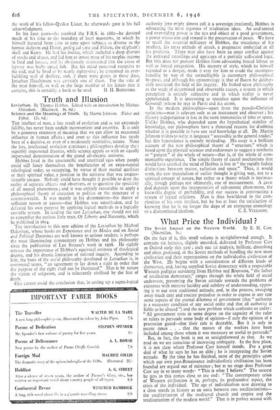Truth and Illusion
THE intellect of man, a late result of evolution and as yet extremely fallible, has never been unduly inconvenient and assertive. It is only by a generous extension of meaning that we can allow its occasional influence in human affairs ; and even so this influence has rarely been of a decisive, or even of a moderately restrictive, nature. None the less, intellectual evolution continues ; philosophers develop the:r superbly impersonal theories, while science appals us with an equally impersonal demonstration of the grand all-electric universe.
Hobbes lived in the unscientific and uncritical ages when people could still fancy themselves the beneficiaries of an extra-natural teleological order, so occupying, by virtue of their mental qualities or their spiritual value, a position in the universe that was unques- tionably unique. Nobody could have thought it possible to deny the reality of separate objects and observers, or to question the speciality of all mental phenomena ; and it was entirely reasonable to apply a philosophical theory of causation to politics or the structure of a commonwealth. It was mainly in his determinism—his theory of sufficient reason or causes—that Hobbes was unorthodox, and he defeated his own purpose by applying logical methods to a logically unstable system. In reading the vast Leviathan, one should not fail to remember the curious little tract, Of Liberty and Necessity, which he published in 1654.
The introduction to this new edition of the Leziathan by Michael Oakeshott, whose books on Experience and its Modes and on Social and Political Doctrines are well known to serious readers, is perhaps the most illuminating commentary on Hobbes and his philosophy since the publication of Leo Strauss's work in 1936. He rightly stresses the importance of Hobbes's equivocal estimate of theological dogma, and his drastic limitation of rational inquiry. According to him, the basis of the social philosophy developed in Leviathan is, in communal terms, "an agreement to lay down a right in order that the purpose of the right shall not be frustrated." Man is by nature the victim of solipsism, and is reluctantly civilised by the fear of death.
One cannot avoid the conclusion that, in setting up a supra-logical authority (one might almost call it a sovereign irrational), Hobbes is advocating the most rigorous of totalitarian ideas. An undisputed
and over-riding power is the test and object of a good government, a power whose aim and reward is the preservation of peace. We have to recall the essential militancy of Hobbes, the truculence of his intellect, his tense attitude of attack, a pragmatist embattled in all his positions. There may also have been an inner conflict against the awkward uncoilings and uprisings of a partially suffocated logic. But this does not prevent Hobbes from advocating forced labour as well as forced emigration. His mastery of style, which he himself regarded as a danger, made it easy for him to evade the incompre- hensible by way of the unintelligible (a customary philosophical by-pass), and although his epistemology is that of Bacon he deliber- ately restricted the field of his inquiry. He looked upon philosophy as the study of determined and observable causes, a system in which perception is entirely subjective and in which reality is never apprehended. It is interesting to speculate upon the influence of Gassendi (whcm he met in Paris) and his atoms.
In the modern philosophies—apart from the pseudo-Christian variations—man is relevant only as an instrument and observer ; his illusory independence is lost in the stern immensities of time or space. Unlike Hobbes, who depended upon the hypothetical stability of knowledge, our philosophers have a thousand reasons for doubting whether it is possible to have any real knowledge at all. Dr. Martin Johnson wishes to write in language" accessible to the general reader," but this benevolence is entirely misleading. His essay is a brilliant account of the new philosophical theory of "structure," which is based upon the physical sciences and endeavours to suggest a synthesis or " pattern " of the whole of nature—that is, of the whole of com- municable experience. The simple theory of causal mechanisms that would have satisfied the mind of Hobbes is lost in" the rapidly fading distinctions between matter, radiation and space." Thus, it would seem, the raw materialism of earlier thought is giving way, not to a spiritual concept of nature, but rather to a theory which is intrinsic- ally, though perhaps not ultimately, one of measurement. A great deal depends upon the interpretation of sub-atomic phenomena, the knowable degree of probability, and our success in constructing a system of logical relations. Man is thus bewildered in the com- plexities of his own intellect, but he has at least the satisfaction of knowing that he is no longer the dupe of an erroneous cosmology


































 Previous page
Previous page